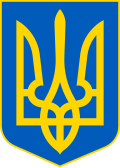This article includes a list of references, related reading, or external links, but its sources remain unclear because it lacks inline citations .(May 2020) |
You can help expand this article with text translated from the corresponding article in Finnish. (July 2022)Click [show] for important translation instructions.
|
 | |
Finland | Ukraine |
|---|---|
| Diplomatic mission | |
| Embassy of Finland, Kyiv | Embassy of Ukraine, Helsinki |
Before 1918, both Finland and Ukraine were part of the Russian Empire. In 1918, Finland was one of the first countries to recognise Ukraine and open a diplomatic mission in Kyiv. Finland once again recognised Ukraine on December 30, 1991. Both countries established diplomatic relations on February 26, 1992. Finland is a member of NATO and the European Union which Ukraine applied for in 2022. Both countries are full members of Council of Europe. Finland fully supports Ukraine's bids to join the European Union and NATO.







